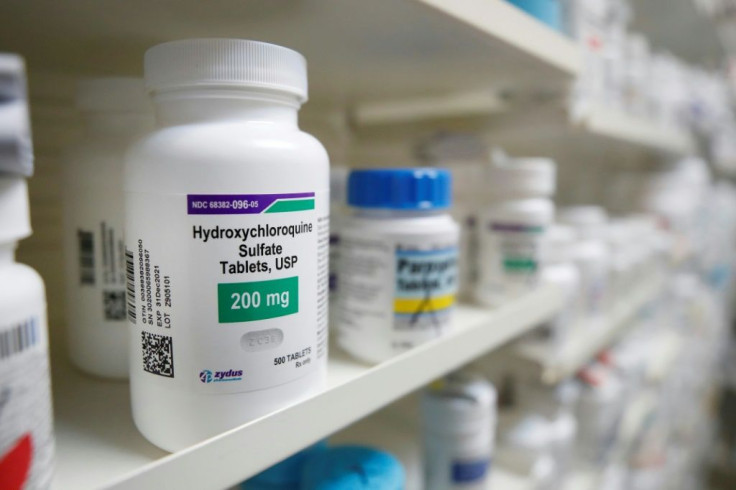Does Trump's Coronavirus Drug Work? New Study Shows If Hydroxychloroquine Can Cure COVID-19

KEY POINTS
- Hydroxychloroquine is an anti-malarial that also is used to treat lupus and rheumatoid arthritis
- Anecdotal evidence from China and France had indicated it could be useful in treating COVID-19 patients
- The University of Minnesota study was double-blind, meaning subjects didn't know if they were getting the drug or a placebo
President Trump’s preferred drug for preventing and treating coronavirus doesn’t do either once someone has been exposed, a study published Wednesday showed. The study, the first randomized clinical trial of the drug, found hydroxychloroquine was no more effective than a placebo.
The study was published in the New England Journal of Medicine. An earlier study published in the Lancet found the drug had an adverse effect on some patients, but the underlying data has since come into question.
The study did not address the question of whether the drug is effective if taken before someone has been exposed to the virus, which has killed more than 382,451 people worldwide since the pandemic began late last year.
Trump repeatedly has pushed hydroxychloroquine, an anti-malarial drug that also is used to treat lupus and rheumatoid arthritis, as a preventative or cure for COVID-19 and said he took the drug for more than a week despite cautions against doing so from the Food and Drug Administration.
University of Minnesota Medical School researchers began their study in mid-March, involving 821 adults in the U.S. and Canada ranging in age from 33 to 50 who had been exposed to COVID-19 through their work in the healthcare field or as first responders. People who lived with someone who had the disease also were included.
The drugs and placebos were mailed to patients, with no indication which was which to eliminate any chance of bias. A weakness of the study was that all participants were not tested for the virus before beginning their regimens because of the lack of testing capability at the time the study began.
Senior investigator and infectious disease specialist Dr. David Boulware said participants in the study were recruited through the internet and social media. About 12 percent of participants getting the drug developed COVID-19 compared to 14% who received the placebo. The difference was not considered statistically significant.
Adding zinc or vitamin C didn’t alter the results.
Side-effects included nausea and diarrhea, but none of the heart arrythmias reported in the Lancet study.
Both the FDA and the National Institute of Allergy and Infectious Diseases have warned the drug should not be taken outside a clinical setting.
“The take-home message for the general public is that if you’re exposed to someone with COVID-19, hydroxychloroquine is not an effective post-exposure, preventive therapy,” Boulware told the New York Times.
Trump’s position on the drug has politicized questions about its use. Despite doubts about its efficacy, the administration said it would send 2 million doses to Brazil, which is quickly becoming an epicenter for the pandemic, with more than 555,300 cases and 39,811 deaths, second only to the United States.
Anecdotal evidence from China and France early in the spread of coronavirus indicated patients benefited from taking the drug.
“As we say in Tennessee, ‘That dog won’t hunt’ — it didn’t work,” William Schaffner, professor of preventive medicine and infectious diseases at Vanderbilt University Medical Center who was not involved in the study, told the Washington Post.
© Copyright IBTimes 2025. All rights reserved.






















